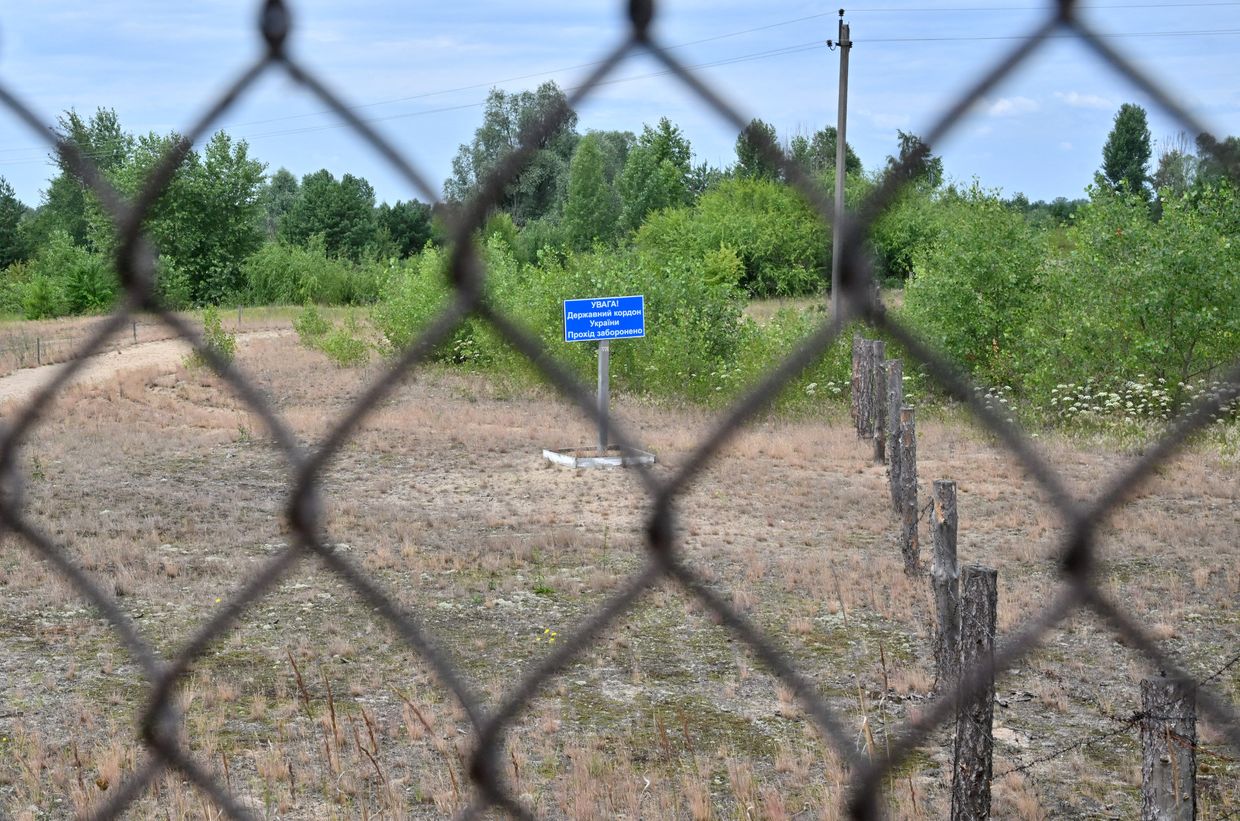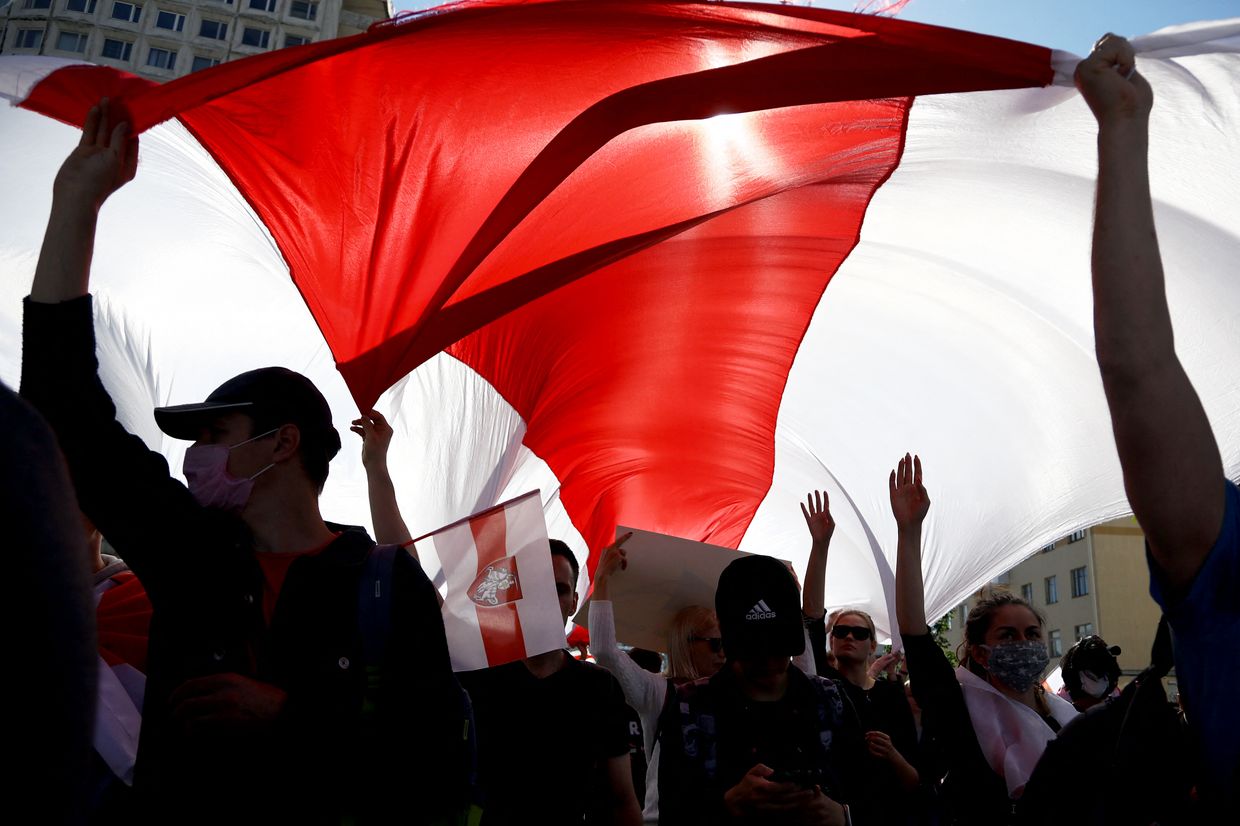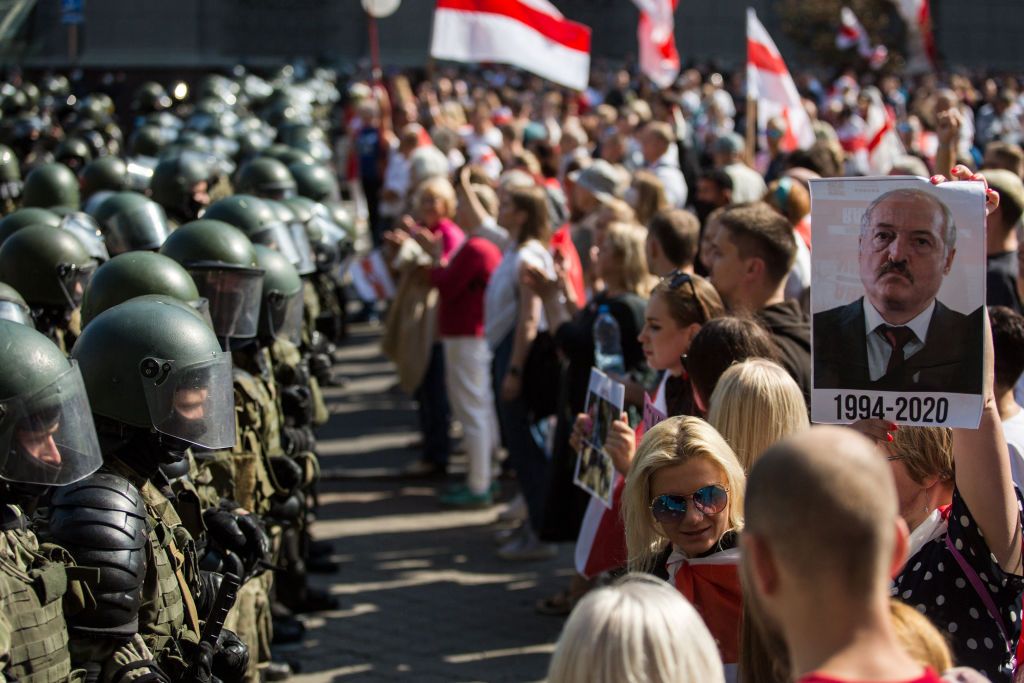Belarus Weekly: Belarusian fighter jets shot at Russian drone, for the first time

Belarusian fighter jets reportedly shot at a Russian drone in Belarusian airspace for the first time.
Sweden to review Belarusian asylum application rulings amid criticism for using outdated country information.
Belarusian activist awaits Serbian court’s extradition ruling, fears persecution and torture at home.
Belarusian dictator Alexander Lukashenko pardons 30 more political prisoners amid ongoing repressions.
At least 126 Belarusians were prosecuted in 2024 for receiving food packages as support for political prisoners' families, human rights group reports.
Noted Belarusian opposition figure Maria Kalesnikava starving in detention, relatives say.
Belarusian propaganda machine ramps up for 2025 presidential elections, announces a new TV channel and Belarusian version of YouTube.
Belarusian fighter jet shoots at stray Russian drone in Belarussian airspace for first time, monitoring group reports
A Belarusian fighter jet engaged a Russian Shahed-type drone that veered off course into Belarus’ airspace during an overnight attack against Ukraine on Aug. 29, the Belarusian Hajun monitoring group has reported.
According to Belarusian Hajun, the drone entered Belarusian airspace in Yelsk District of Homel Oblast around 3.30 a.m. while the fighter jet was patrolling the area. Twenty minutes later, at about 3:55 a.m., two explosions could be heard, and a bright flash was observed over Yelsk District.
The monitoring group suggested the explosions were from the drone being fired on, writing that "this is probably the first recorded case when a fighter jet of the Belarusian Air Force attempted to destroy a real military target in the sky.”
The Kyiv Independent could not immediately verify the claim. The Belarusian Defense Ministry has not commented on the alleged incident.
Irrespective of the event, the 61st Fighter Aviation Base of Baranovichi told local media on Aug. 29 that air patrols carried out by Su-30SM fighters have currently been stepped up along the Southern Operational Area State Border.
Russian attack drone incursions into Belarusian airspace have been recorded multiple times, with at least nine incidents recorded in July, and six Russian drones reportedly entering Belarusian airspace during the previous mass attack on Ukraine on Aug. 26. The most recent Russian drone incursions were reported on Aug. 31 and Sept. 2.
Minsk has never publicly raised objections about these airspace violations with Moscow – its key ally.
Instead, Belarusian dictator Alexander Lukashenko has claimed his country's forces have downed several Ukrainian drones in Belarusian airspace – a claim denied by Belarusian Hajun.
Lukashenko pardons another 30 political prisoners, 1,400 remain behind bars
Alexander Lukashenko on Sept. 4 signed a decree pardoning 30 prisoners convicted of “protest offenses,” Lukashenko’s press office reported via an affiliated Telegram channel. The report states that seven women and 23 men who are parents to minors were released in what is described as a “humane gesture” and a "chance to return to normal life.” The names of the pardoned remain undisclosed.
According to the press office, all released individuals pleaded guilty and repented in exchange for their pardons and will be monitored by the Interior Ministry for "law-abiding behavior.”
Belarus’ democratic leader Sviatlana Tsikhanouskaya said she was “relieved" that more prisoners were pardoned but called to sustain international pressure on the regime to free all imprisoned on politically motivated grounds.
"Repression continues to escalate, and more than 1,400 remain imprisoned on political grounds. We need sustained international pressure to secure the freedom of all of them,” Tsikhanouskaya wrote on X.
This is the third instance of Lukashenko’s regime releasing political prisoners. According to the Viasna Center for Human Rights, 18 political prisoners were released in Belarus on July 3 ahead of the country’s official Independence Day celebrations, and 21 people were confirmed to be released on Aug. 16.
The announced total number of released prisoners reached 78, while the aggregated reports from human rights activists confirmed the release of only 39 political prisoners so far. Human rights organizations say they are maintaining “information silence” regarding the names of the other released prisoners, citing concerns for their safety.
Sweden to revise Belarusian asylum seekers' applications amid criticism
The Swedish Migration Agency said on Aug. 28 that it would reexamine asylum applications from Belarusian citizens amid criticism that some have been rejected on the basis of outdated information.
Earlier the same day, Sveriges Radio reported that a Belarusian citizen had been detained on politically motivated accusations when crossing into Belarus, after Sweden’s Migration Agency denied him asylum and deported to his home country.
“We are aware of the information and criticism directed at us,” Anna Lindblad of the Swedish Migration Agency was quoted as saying.
In a message to RFE/RL, Swedish Migration Minister Maria Malmer Stenergard said the ministry “will conduct a legal review this autumn regarding the handling of cases from asylum seekers from Belarus.”
According to Sveriges Radio, the man arrived in Sweden with his mother two years ago and filed for asylum, citing fear of returning to their home country over an ongoing criminal investigation in Belarus for participating in the 2020 anti-government protests. Reportedly, both the man’s and his mother’s applications were rejected in 2023, leading to their recent deportation from Sweden to Belarus, via Lithuania.
The publication states the man was immediately detained at the Lithuanian-Belarusian border, while the fate of the woman remains unknown. A third member of the family, the man’s sister, remains in Sweden, but was scheduled to leave the country before Sept. 3, RFE/RL reported.
Sweden has previously rejected applications from notable opposition figures. They include Kanstantsin Syarohin, a member of the election team of jailed presidential candidate Siarhei Tsikhanousky.
In 2023, Sweden granted asylum to only three out of 100 applications submitted by Belarusian citizens, according to Zmitser Vaserman, a representative of the People’s Embassy of Belarus in Sweden, a Belarusian diaspora organization.
Analyzing the rulings, the People’s Embassy of Belarus in Sweden said the main arguments for asylum applications being refused include applicants being able to leave Belarus legally, not applying immediately after the events of 2020, or applicants playing an insignificant role in Belarusian opposition movement, implying that it is safe for the applicants to return to Belarus.
Additionally, the agency said that “limited dissemination” of posts on social media by applicants that are critical of the regime meant that they faced little risk of persecution.
However, Stefan Krstic, an attorney representing several asylum seekers from Belarus in Sweden, says he believes that the asylum applications of many Belarusians have been unfairly rejected by the Swedish Migration Agency on the basis of outdated country data.
“Their asylum cases have been assessed according to the old country information, which said that many of the problems were isolated until 2020, and that there are no signs of opposition members being hunted down (systematically, as according to) the new country information,” Krstic said.
Belarusian activist in Serbia awaiting court ruling amid threat of deportation to Belarus
After an appeals hearing on Aug. 27 for Belarusian opposition activist, journalist, and filmmaker Anddrei Hnyot, a Serbian court now has 30 days to rule on a Belarusian request for the activist’s extradition, which critics say could lead to his imprisonment and torture in Belarus.
Hnyot has been under arrest in Serbia since October 2023. He was detained at Belgrade airport under an Interpol “Red Notice,” request made by Belarus. Accused of tax evasion – an accusation that Hnyot dismisses as a faux pretext for politically motivated persecution – the activist spent seven months in custody before being placed under house arrest.
The activist appealed against a court ruling made in May and sustained by a higher court in July that would have permitted his extradition to Belarus. The Court of Appeal is the final instance standing between the activist and extradition to Belarus, which human rights activists believe is fraught with the risk of torture and even death in detention.
The case again demonstrates how authoritarian regimes like Belarus can exploit Interpol’s “Red Notice” to harass dissidents beyond their borders with politically motivated charges. In February, Interpol temporarily blocked access to Hnyot’s data in its database.
Hnyot said the European Court of Human Rights (ECHR) in Strasbourg has denied the activist protection from extradition three times, citing the premature nature of the request. “(The ECHR) may change its decision ... after the Serbian trial, which will be the last and final one,” Hnyot wrote on Facebook.
Belarusian Human rights activist Aliaksei Liavonchyk notes that the ECHR can intervene once a verdict has been reached by the court of final instance, but warns that an extradition ruling in Serbia can be executed within 3-4 hours on the announcement of the decision, making it unlikely that the ECHR’s request would reach Belgrade in time.
In July, the International Federation for Human Rights (FIDH) and Amnesty International urged Serbia to adhere to its human rights obligations and not go ahead with the extradition.
Prominent filmmakers, including Wim Wenders, Yorgos Lanthimos, Agnieszka Holland, and Juliet Binoche have signed a petition to the Court of Appeal in Belgrade and, personally, Serbia’s Justice Minister Maja Popović, calling on the Serbian authorities to prevent the extradition.
Hnyot participated in widespread protests, among thousands of others, against Belarus’ president in 2020 after elections that were widely declared not to have been free and fair. He founded Belarus’ Free Association of Athletes, which was later branded as an extremist organization by the Belarusian government.
Following a brutal crackdown on civil society in Belarus, hundreds of thousands of Belarusians were forced to flee. However, the regime of Belarusian dictator Alexander Lukashenko employs various mechanisms, like Interpol warrants and in absentia trials, to punish critics who have fled abroad.
Viasna: 126 Belarusians charged over receiving aid for political prisoners
At least 126 Belarusians – relatives of political prisoners and people formerly detained on politically motivated grounds – have been fined for receiving food packages from an exiled Belarusian solidarity initiative, the Viasna Human Rights Center reported on Sept. 3.
The regime of Belarusian dictator Alexander Lukashenko cracked down on Belarusians for receiving aid by carrying out a massive raid on families massive raid on families of political prisoners in January 2024. The raid targeted at least 287 individuals, according to the Viasna Human Rights Center.
The activists linked the mass raids to the emergency food assistance project INeedHelpBY, which was supporting people who have lost their income due to political repression in Belarus. The Belarusian KGB security service earlier designated the project an “extremist formation.”
Thirty individuals have been detained on criminal charges for supporting political prisoners financially since the last wave of detentions. At least 126 Belarusians were found guilty of receiving foreign aid to pursue “extremist activities.”
According to Belarusian state prosecutors, receiving such aid for those with “pseudo-status of ‘political prisoners’” was enabling extremist activities by “illegally (reducing) the consequences of prosecution, harming the state and public interests.”
Those convicted were fined roughly $125 to $370 and ordered to “compensate” the state for the full value of the aid received.
For over 1,400 political prisoners in Belarus, support from their friends and relatives is their only lifeline in detention, and this often drains the family budget. With the officially reported average salary in Belarus being roughly $740 per month (as of July 2024), families say they spend at least $60-100 on a lawyer for each prisoner visit, and $158 per package of food and personal belongings for a prisoner in pre-trial detention.

Relatives alarmed over health of Maria Kalesnikava, reportedly starving in detention
Prominent political prisoner Maria Kalesnikava is “practically starving” in detention, the prisoner’s sister, Tatsiana Khomich, has written in a Facebook post.
Khomich demanded that her sister, who is being held incommunicado, be provided with proper nutrition and medical care, and that she be allowed to contact her family.
She said that Kalesnikava now weighs only 45 kilograms. The normal range of weight for a woman of Kalesnikava’s height (170 centimeters, or 5 feet 7 inches) is between 57 and 74 kilograms.
Kalesnikava, a leading figure in Belarusian civil society’s resistance to the regime of Belarusian dictator Alexander Lukashenko, is four years into an 11-year prison sentence on trumped-up charges of “extremism” and “plotting to seize power.” In November 2022, she was admitted to intensive care after suffering from a perforated ulcer.
She has since been returned to serve her sentence in a penal colony without any accommodation for her health condition. According to Khomich, Kalesnikava is unable to eat prison food due to her health condition. Additionally, her limit of roughly 40-80 rubles ($10-20) for shopping at the prison shop provides for near-starving conditions, making her choose between buying personal hygiene products or food.
“It’s not about punishing a criminal,” Khomich writes. “It’s not about isolating a political opponent. It’s torture and abuse of a human being, it’s a crime against humanity. It’s unacceptable that in the twenty-first century, in the center of Europe, in prison, a person could be starved to death.”
Citing its sources, the Belarusian edition of Russian independent medium Mediazona reports that the penal colony administration had kept Kalesnikava in a solitary confinement cell for 18 months, despite the allowed maximum for this punitive measure being set at six months.
Six political prisoners have died in Belarusian prisons since 2020, five of them – due to lack of adequate medical care irrespective of their health conditions.
Belarusian propaganda media gear up for next year’s presidential election
The launch of a new pro-government TV channel and the Belarusian version of YouTube were announced during a meeting on Aug. 29 between Belarusian dictator Alexander Lukashenko and his chief propagandists.
The only part of the meeting disclosed to the public concerned discussions about the role of media in the upcoming Belarusian presidential elections in 2025.
“We’re about to enter the election campaign,” Lukashenko was quoted by his press office as saying. “Naturally, the media, fortunately, thank God, will play … one of the leading roles in this situation.”
Attending the meeting with Lukashenko were the deputy head of his administration, Uladzimir Piartsou (ex-Minister of Information), Information Minister Marat Markau, Lukashenko’s press secretary Natalia Eismant, and her husband Ivan Eismont, the chairman of the sanctioned Belteleradiocompany. Lukashenko instructed the media to showcase his regime’s “achievements” while not showing bias towards him in the upcoming elections.
“We have to show in this election campaign what we have achieved at this time,” Lukashenko said. “… (But) we don’t need to favor the incumbent president if he is a candidate. We should (just) calmly show what we have (achieved).”
The head of Lukashenko’s administration, Piartsou, reported that a new state-owned TV channel was ready to start broadcasting. Presented earlier that day, the “First News TV Channel” was described as a “24/7 information channel” that would include TV broadcasts, online news, and corresponding social media coverage.
Piartsou also announced plans for the launch on Sept. 12 of a Belarusian version of the video hosting site YouTube. While admitting that the new service was still “weak,” he said it was the first step toward launching Belarus’ own YouTube.
While Belarus has not slowed the real YouTube down as Russia has recently done, the Belarusian authorities have drawn up a list of so-called “extremist materials.” The list of over 4,000 entries features various independent media websites, along with Telegram and YouTube channels, interaction with which is punishable by fines.
The authorities also interfered with access to YouTube in January 2024 to prevent Belarusians from watching a New Year’s Eve address given by exiled opposition leader Sviatlana Tsikhanouskaya.
The next presidential election in Belarus is to be held no later than July 20, 2025. According to a report by the exiled association of former law enforcers BelPol, the election date has already been scheduled for Feb. 23, 2025.
Lukashenko has made several contradictory statements about whether he will run for another, seventh, consecutive term in office, first announcing his plans to run and then retracting his statements – a typical obfuscation strategy he has employed in every previous campaign.













